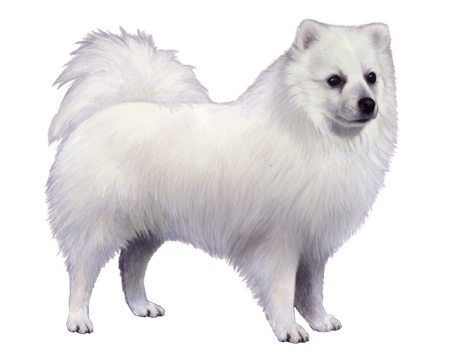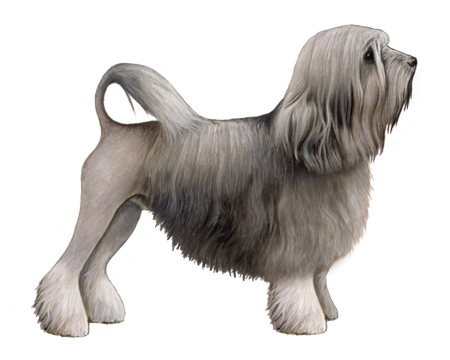
Finnish Spitz
The Finnish Spitz is a small, fearless hunting breed that is tenacious in its pursuit of game. The only thing this breed does better than flush out its prey is bark. Frequent vocalizations earned the Finnish Spitz the nickname "barking bird dog."
Interested in discovering if your dog is a Finnish Spitz?
Check out Wisdom Panel's DNA tests.

Finnish Spitz Traits
General Appearance
Finnish Spitz are medium-sized dogs with balanced bodies, bold carriage, brisk movements, and a fox-like appearance.
Coat and Coloring
The Finnish Spitz is a double-coated breed. They have short, soft, dense undercoats in a paler color and long, harsh, straight hairs on their outer coats. Their coats are stiffer and longer on their necks and back. Male dogs also have more profuse coats around their shoulders.
Their fox-like appearance is partially due to their red coat color, which ranges from pale honey to deep auburn. Because the breed's coloring includes shades of red and is never monochromatic, people have described it as having a "Finnish Spitz glow." Some dogs may have white markings on the tips of the toes and black hairs along the lip line.
Distinctive Physical Traits
Distinguishing traits of the Finnish Spitz include square proportions, almond-shaped eyes, small ears that stand erect when alert, a narrow muzzle, and a plumed tail.
Finnish Spitz Temperament
The Finnish Spitz is an active, eager, and friendly dog with a reputation as an excellent hunter. In addition to their hunting skills, they also make fantastic watchdogs (in part because they tend to be suspicious of strangers).
Finnish Spitz love to bark and "practice" often. Their propensity for barking—they can bark up to 160 times in one minute—is perfect for King Barker competitions like those held in Finland. However, it's not a skill that neighbors with shared walls tend to appreciate, so apartment life is not a good fit for these dogs.
Finnish Spitz can be independent and stubborn, but also affectionate and sensitive. These sporty dogs need lots of exercise. Thanks to the deep bonds that the breed forms with their families, they prefer being part of family activities.
Their keen sense smell—which makes them invaluable on hunting trips—makes the Finnish Spitz prone to following their noses whenever they're outside. It's best to keep them on a leash or in a fenced yard to keep them from roaming.


Finnish Spitz History
Despite its name, the Finnish Spitz originated in Russia. Russian migrants traveled to Finland with their dogs more than 3,000 years ago, and the breed fast became popular hunting dogs.
The Finnish—whose name for the breed is Suomenpystykorva—still use these dogs to flush out birds and hunt game. Finnish Spitz are also good all-around companions and have become popular, beloved pets in Finland (with a growing following around the world).
Also known as Finkies or Finns, these dogs follow their noses to find birds and use their slow-wagging tails and rapid barks to freeze game in place. Hunters then scout the woods looking for the swishing tails and take down the game their dogs are guarding.
By 1880, transportation had evolved and brought diverse people (and their dogs) together. The Finnish Spitz mated with other dog breeds and approached extinction as a distinct breed. To rescue the breed, breeders created a foundation stock of pure Spitz. The breed—and its hunting prowess—were restored.
Finnish Spitz Care
Nutrition
Though the Finnish Spitz is a highly active breed, these dogs also have efficient metabolisms. Be careful not to overfeed them, which can lead to obesity. Choose a high-quality dog food that's appropriate for their life stage (e.g., puppy, adult, senior) and look for foods formulated for active breeds. Limiting treats to no more than 10% of daily calories can help keep Finnish Spitz at a healthy weight.
Grooming
When it comes to grooming, the Finnish Spitz requires little more than the occasional bath and brushing. However, they go through periods of seasonal shedding twice a year. During these times, they benefit from extra brushing to remove dead hair. Intact females tend to have more severe shedding than spayed females.
Finnish Spitz also benefit from regular dental care. Start brushing their teeth at home when they're young and consult with a veterinarian about professional dental cleanings to ensure good oral hygiene.
Exercise
Finnish Spitz are eager athletes bred to spend hours racing through dense woods in pursuit of prey. While the breed has transitioned from a hunting dog to a human companion, these dogs still require a lot of exercise. Long leashed walks (or runs) are necessary to tire out a Finnish Spitz. These dogs are known for their speed and stamina—without a secure fence, one of these pups can run for hours.
Obedience competitions, flyball, rally, lure coursing, and other activities that allow the breed to show off their speed and stamina are excellent for Finnish Spitz.
Training
Like most highly intelligent breeds, the Finnish Spitz can be hard to train. Keep training sessions short and upbeat, and reduce their stubborn tendencies by using motivational tools such as treats and favorite toys. Finnish Spitz also love spending time with their people, and training sessions provide a fun opportunity for bonding.

Breed Group
Companion
This group consists of dogs typically bred for the specific purpose of human companionship, and many are popular pets because of their gentle nature. They became more common as the concept and luxury of dogs as pets prevailed.



























_Color.png)





















